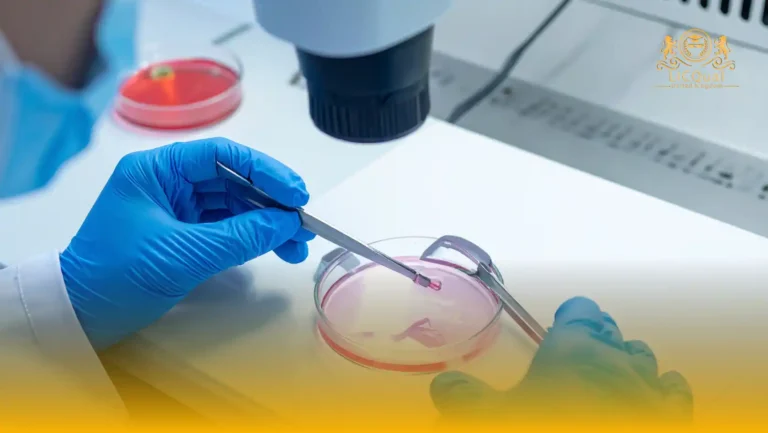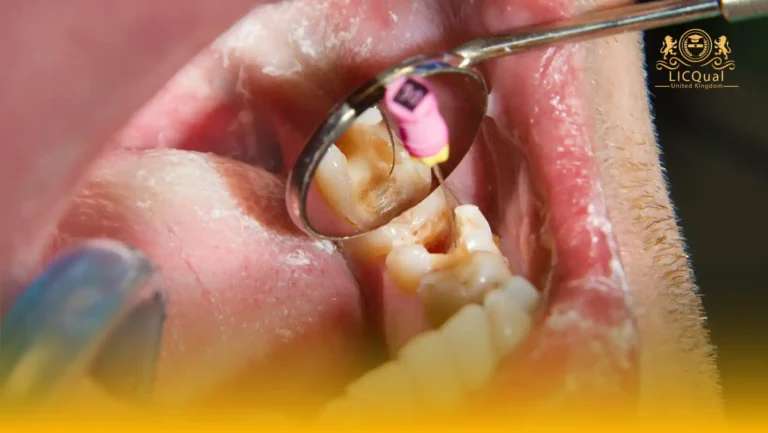The LICQual Level 7 Postgraduate Diploma in Endocrinology (PgDE) is designed for healthcare professionals seeking to deepen their knowledge and enhance their expertise in the specialised field of endocrinology. This qualification is not intended for fresh candidates but is aimed at experienced professionals who wish to advance their careers, expand their understanding of endocrine disorders, and further their Continuing Professional Development (CPD).
Applicants for this course must meet specific entry requirements, ensuring that learners have the necessary foundation to succeed at a postgraduate level. Suitable candidates include healthcare professionals such as endocrinologists, general practitioners, nurses, and allied health professionals who are already working in clinical settings and looking to specialise or gain a deeper understanding of endocrinology.
Centres offering the LICQual Level 7 Postgraduate Diploma in Endocrinology must meet high standards of quality education and training. They should employ qualified and competent staff with significant expertise in endocrinology and related fields. In addition, centres must have the necessary resources, including clinical facilities, learning materials, and technology, to provide a comprehensive learning experience. The centre must be committed to supporting learners throughout their academic journey, offering access to practical experiences, research, and up-to-date clinical knowledge.
This diploma provides learners with the knowledge and practical skills needed to excel in the diagnosis, management, and treatment of endocrine disorders, empowering healthcare professionals to offer high-quality care to patients with complex endocrine conditions.
Course Overview
Qualification Title
LICQual Level 7 Postgraduate Diploma in Endocrinology (PgDE)
Total Units
6
Total Credits
120
GLH
600
Qualification #
LICQ2200986
Qualification Specification
To enroll in the LICQual Level 7 Postgraduate Diploma in Endocrinology (PgDE), applicants must meet the following criteria:
|
Qualification# |
Unit Title |
Credits |
GLH |
|---|---|---|---|
|
LICQ2200986-1 |
Advanced Endocrine Physiology |
20 |
100 |
|
LICQ2200986-2 |
Clinical Assessment in Endocrinology |
20 |
100 |
|
LICQ2200986-3 |
Endocrine Disorders and Their Management |
20 |
100 |
|
LICQ2200986-4 |
Pharmacology and Therapeutic Approaches in Endocrinology |
20 |
100 |
|
LICQ2200986-5 |
Endocrinology in Special Populations |
20 |
100 |
|
LICQ2200986-6 |
Research and Evidence-Based Practice in Endocrinology |
20 |
100 |
By the end of this course, learners will be able to:
Unit 1: Advanced Endocrine Physiology
By the end of this unit, learners will be able to:
- Analyse the structure and function of the endocrine system, including the physiological mechanisms of hormone secretion, regulation, and feedback.
- Evaluate the role of endocrine glands in maintaining homeostasis and their interactions with other physiological systems.
- Critically assess how dysregulation of endocrine functions leads to disorders and disease states.
- Apply advanced knowledge of endocrine physiology to clinical practice in the management of endocrine disorders.
Unit 2: Clinical Assessment in Endocrinology
By the end of this unit, learners will be able to:
- Demonstrate advanced skills in clinical assessment, including patient history taking, physical examination, and diagnostic testing specific to endocrine disorders.
- Interpret laboratory test results, such as hormone assays, imaging studies, and other diagnostic procedures used in endocrinology.
- Assess and identify clinical signs and symptoms of common and complex endocrine disorders.
- Formulate differential diagnoses based on clinical and diagnostic findings to guide effective treatment plans.
Unit 3: Endocrine Disorders and Their Management
By the end of this unit, learners will be able to:
- Critically evaluate the pathophysiology and clinical manifestations of common endocrine disorders, including diabetes mellitus, thyroid disorders, adrenal insufficiency, and pituitary diseases.
- Apply evidence-based clinical management strategies for treating a range of endocrine conditions.
- Develop and implement personalised care plans for patients with complex endocrine disorders, integrating pharmacological and non-pharmacological treatments.
- Assess the impact of long-term management strategies on patient outcomes in endocrine care.
Unit 4: Pharmacology and Therapeutic Approaches in Endocrinology
By the end of this unit, learners will be able to:
- Analyse the pharmacokinetics and pharmacodynamics of medications used in the treatment of endocrine disorders.
- Evaluate the clinical indications, dosages, side effects, and drug interactions of common endocrine medications.
- Develop appropriate therapeutic regimens based on the individual needs of patients with endocrine conditions.
- Critically assess the role of emerging therapies, including biologic agents, in the treatment of endocrine disorders.
Unit 5: Endocrinology in Special Populations
By the end of this unit, learners will be able to:
- Identify and evaluate the unique challenges of diagnosing and managing endocrine disorders in special populations, including the elderly, pregnant women, and children.
- Develop tailored management strategies for endocrine conditions in these populations, considering age, comorbidities, and other health factors.
- Assess the impact of endocrine diseases on reproductive health, pregnancy, and growth in children and adolescents.
- Apply evidence-based guidelines in the management of endocrine disorders in vulnerable populations.
Unit 6: Research and Evidence-Based Practice in Endocrinology
By the end of this unit, learners will be able to:
- Critically appraise current research in endocrinology, including clinical trials, systematic reviews, and meta-analyses.
- Integrate evidence-based practices into clinical decision-making for the management of endocrine disorders.
- Conduct research or audits to evaluate the effectiveness of endocrine therapies and clinical practices in improving patient outcomes.
- Contribute to the development of best practice guidelines and protocols in endocrinology based on the latest evidence.
The LICQual Level 7 Postgraduate Diploma in Endocrinology (PgDE) is ideal for healthcare professionals who want to specialize in hormonal and metabolic disorders. This course is perfect for doctors, endocrinologists, nurses, allied health professionals, and researchers seeking advanced knowledge, practical expertise, and international recognition. It provides comprehensive training in endocrine diseases, patient-centered care, diagnostic techniques, and treatment strategies to advance careers and leadership in endocrinology.
Medical Doctors and Physicians
- Enhance diagnostic skills in endocrine and metabolic disorders
- Manage complex conditions like diabetes, thyroid, and adrenal diseases
- Develop advanced clinical decision-making capabilities
- Learn evidence-based treatment strategies
- Earn a UK-recognized Level 7 postgraduate qualification
- Prepare for leadership roles in hospitals and clinics
Endocrinologists and Specialist Physicians
- Deepen knowledge of advanced endocrine and metabolic care
- Master management of hormonal disorders
- Gain practical experience in patient-centered care
- Improve outcomes for complex endocrine cases
- Strengthen professional credibility internationally
- Engage in research and clinical audits in endocrinology
Nurses and Advanced Practice Clinicians
- Expand understanding of endocrine patient assessment
- Learn advanced monitoring and management techniques
- Enhance patient education and communication skills
- Develop competencies in multidisciplinary care teams
- Apply evidence-based practices in clinical settings
- Access flexible study options for busy professionals
Allied Health Professionals and Clinicians
- Understand endocrine system disorders and treatments
- Gain skills in supporting multidisciplinary care plans
- Learn strategies for patient management and counseling
- Strengthen collaboration with physicians and specialists
- Improve care delivery in hospital and community settings
- Prepare for advanced clinical roles in endocrinology
Biomedical Scientists and Researchers
- Study endocrine pathophysiology and metabolic mechanisms
- Conduct applied research in hormonal medicine
- Collaborate with clinicians on studies and trials
- Present findings in academic and professional forums
- Contribute to innovations in diagnosis and treatment
- Expand career opportunities in research and academia
Healthcare Administrators and Managers
- Understand operational management of endocrine departments
- Develop policies for patient safety and quality care
- Learn resource allocation and workflow optimization
- Strengthen leadership and decision-making skills
- Support evidence-based clinical governance
- Enhance hospital and clinic program efficiency
International Medical Graduates and Specialists
- Earn a UK-recognized diploma for global career mobility
- Adapt knowledge to international healthcare standards
- Strengthen credentials for licensure or specialist recognition abroad
- Access flexible online and blended learning options
- Join a network of global endocrine medicine professionals
- Expand opportunities in clinical practice, research, and teaching
To offer the LICQual Level 7 Postgraduate Diploma in Endocrinology (PgDE), centres must meet specific requirements to ensure high-quality education and learner success. The following criteria are essential for accredited centres:
- Qualified and Experienced Staff: Centres must employ qualified and experienced instructors with expertise in endocrinology and clinical practice. Trainers should hold relevant advanced degrees and certifications in endocrinology or related healthcare fields, with a proven track record in both clinical practice and teaching.
- Specialised Clinical Facilities: Centres must provide access to specialised clinical facilities equipped for teaching advanced endocrinology. This includes access to diagnostic tools such as hormone assays, imaging technologies, and laboratory resources to support practical learning and research.
- Comprehensive Learning Resources: Centres should offer a wide range of learning materials, including textbooks, scientific journals, clinical case studies, and access to digital resources. These materials must support both theoretical and practical components of the curriculum, ensuring that learners have access to the most current research and evidence-based practices.
- Clinical Placement Opportunities: Centres must provide opportunities for learners to gain practical experience in healthcare settings, particularly in departments specialising in endocrinology. This enables learners to apply their theoretical knowledge in real-world clinical environments, enhancing their learning experience.
- Administrative Support: Centres should have a strong administrative framework to manage learner enrolments, progress tracking, and academic support. This includes offering guidance on assessments, coursework, and managing examinations to ensure learners are on track to complete the programme successfully.
- Compliance with Quality Standards: Centres must adhere to international and national quality assurance standards in education. This includes maintaining accurate records, conducting regular assessments, and ensuring teaching practices align with professional and academic standards in endocrinology.
- Commitment to CPD: Centres should support learners’ Continuing Professional Development (CPD) by offering additional resources such as workshops, webinars, and access to conferences in endocrinology. This commitment ensures that learners can continue their professional growth beyond the classroom.
- Health and Safety Protocols: Centres must have appropriate health and safety protocols in place, especially when using clinical equipment or interacting with patients during placements. Compliance with local healthcare regulations and ethical standards is essential to maintain a safe and supportive learning environment.
By meeting these requirements, centres can provide a robust, high-quality learning environment that supports the professional development of learners and ensures they are equipped with the advanced knowledge and skills required to excel in endocrinology.
Assessment and Verification
All units within this qualification are subject to internal assessment by the approved centre and external verification by LICQual. The qualification follows a criterion-referenced assessment approach, ensuring that learners meet all specified learning outcomes.
To achieve a ‘Pass’ in any unit, learners must provide valid, sufficient, and authentic evidence demonstrating their attainment of all learning outcomes and compliance with the prescribed assessment criteria. The Assessor is responsible for evaluating the evidence and determining whether the learner has successfully met the required standards.
Assessors must maintain a clear and comprehensive audit trail, documenting the basis for their assessment decisions to ensure transparency, consistency, and compliance with quality assurance requirements.







